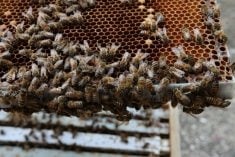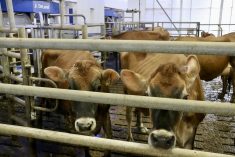A bill to create harsher penalties for unlawful entry onto farms and biosecure zones is back before the House of Commons after a previous iteration died on the order table in 2021.
Conservative MP John Barlow brought forward Bill C-275, “an Act to amend the Health of Animals Act (biosecurity on farms),” as a private members bill. It arrived before the Commons standing committee on agriculture and agri-food on Sept. 28.
Barlow, the Conservatives’ shadow minister for agriculture, agri-food and food security, and MP for the southwestern Alberta riding of Foothills, had also put forward the previous version, Bill C-205, in 2020. The new bill takes up roughly where it left off.
Read Also

B.C. ostriches culled, CFIA confirms
Ostriches on an embattled Edgewood, B.C. farm have been culled after a prolonged legal battle, the Canadian Food Inspection Agency has confirmed.
It states: “No person shall, without lawful authority or excuse, enter a building or other enclosed place in which animals are kept, or take in any animal or thing, knowing that or being reckless as to whether entering such a place or taking in the animal or thing could result in the exposure of the animals to a disease or toxic substance that is capable of affecting or contaminating them.”
It applies fines up to $250,000 or up to two years’ jail time for individuals, and fines up to $500,000 for organizations.
While not explicitly mentioned, Barlow indicated the bill is in reaction to actions of activists, such as those who snuck into a turkey farm in his riding — likely a reference to a 2019 incident in which a group of activists broke into a turkey barn on a Hutterite colony north of Fort Macleod.
Barlow told the committee the bill applies existing penalties in the Health of Animals Act to people who trespass on farms in ways that contravene biosecurity practices and increases penalties to groups who encourage these actions.
While a few provinces have similar laws, “I think it behooves us as the federal government to have a national program in place that will cover all provinces and territories because that is not happening now,” Barlow said.
He added that while trespassing laws might apply to these scenarios, they only applied small fines that would not be enough to deter groups who he said fundraise off protests.
“There has to be teeth to this,” he said.
Barlow said the act would not limit people’s rights to protest, or target whistleblowers who lived or worked on the farm.
“This bill does not limit an individual’s rights to peaceful protest on public property,” he said. “This bill also does not prevent whistleblowers from coming forward when they are witnesses to practices that jeopardize our food security, our food safety or the welfare of animals. Canadian farmers and ranchers have a moral and legal obligation to look after their animals.”
Barlow also argued that the bill would help protect the mental health of farm families who feel targeted and attacked by activists.
Bill C-275 incorporates some of the amendments made to C-205 but drops a previous amendment that dropped “without lawful authority or excuse.”
When questioned about this, he told the committee that stakeholders saw this as redundant, as the bill had already been carefully worded to protect whistleblowers.
That amendment had been made by NDP agriculture critic Alistair MacGregor, who argued that references to trespassing must be removed as trespassing laws are not federal jurisdiction.
“If you are a farmer or farm employee, if you are a transport driver or if you are a protester, if you violate the biosecurity protocols in place on a farm, this law applies equally to you. That’s the main essence of my putting it forward,” he said in a committee meeting in June 2021.
In a meeting Thursday, Barlow said that on Oct. 16, the Commons ag committee would consider the bill clause by clause before returning it to the Commons to be voted on.
— Geralyn Wichers is a reporter for the Manitoba Co-operator.















